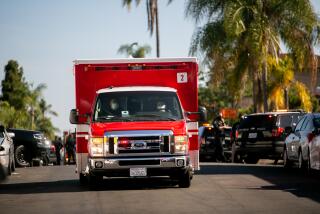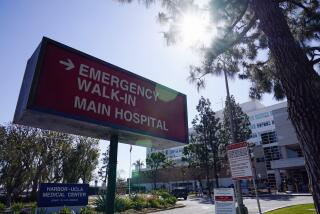At Massachusetts General, ‘some woke up with no legs’
BOSTON — When the call came for trauma surgeons to report to the ER at Massachusetts General Hospital, Dr. George Velmahos was uniquely prepared to deal with the crisis.
Velmahos, 51, a professor of surgery at Harvard Medical School and a leader of the trauma team at Mass General, trained in South Africa treating blast victims and later worked for a decade treating trauma patients at L.A. County-USC Medical Center until 2004. On Sunday, he had just pulled a shift in the ER treating victims of a stabbing, a shooting and a car crash.
FULL COVERAGE: Boston Marathon attack
“A lot of us have experience from overseas, some on battlefields” in Iraq and Afghanistan, he said of fellow surgeons.
What they saw roll in the emergency room doors Monday was still confounding, he said: first five critical patients, then almost immediately another five, then more and more. In all, the hospital treated 34. Of those, many were treated and released, or transferred to a nearby infirmary with eardrum injuries from the explosion. A dozen were admitted, many with legs shredded.
Deciding whether to amputate a leg can be one of the toughest decisions a surgeon faces, Velmahos said--a difficult judgment call. But for the worst patients he saw Monday, he said, “it wasn’t a hard decision.”
“We just finished the job the bomb did--their limbs were completely mangled, some hanging by a shred,” he said. “There was no question whether these limbs would remain alive.”
He and other trauma doctors praised the efforts of Boston Emergency Medical Services to divide patients among area hospitals, ensuring all were treated quickly.
At Mass General’s ER, plastic surgeons and other specialists were on hand to assist. One trauma surgeon who had just finished the marathon rushed in to assist. At one point, Velmahos said, there were as many surgeons as patients in the ER, about 20.
They did their best to remove blast debris from patients’ legs, including metal fragments he described as “spiked points that resembled nails without heads” and pellets slightly larger than BBs. All that debris has been turned over to federal investigators, he said.
“We really chased after as much debris as we could, as many pellets as we could,” he said, taking X-rays to find stray pellets they may have missed, but “many of them have just been left in because to chase after them would just create more damage.”
Four patients had legs amputated, all above the knee, he said. More surgeries were planned Tuesday as surgeons attempted to preserve the other leg of one of the amputees, which was also injured, Velmahos said.
“His other leg is in bad shape, and we’re doing all we can to save it,” he said.
Another patient was also at risk of losing a leg Tuesday, he said, but “I hope we will be able to save both of them.”
Most of the victims were under age 50 and from Massachusetts, none of them runners, Velmahos said. He said their positive outlook left him “moved and really amazed.”
“Some of them woke up today with no legs and told me they were just happy to be alive. Some of them said they thought they were lucky,” he said.
Velmahos said the experience of treating such extreme trauma victims had touched him.
“I don’t think there is a single person in Boston that hasn’t suffered an emotional toll” from the blast, he said.
When Massachusetts Gov. Deval Patrick visited Mass General on Tuesday and asked what he could do to help, trauma chief Dr. Alasdair Conn was blunt: “Find the people who did this.”
Velmahos said Tuesday that during the next 24 hours, he would be monitoring patients’ blood pressure, making sure they remained stable and didn’t lose too much blood. He was encouraged Tuesday when some volunteers stopped him in a hospital corridor to ask where they could donate blood. In coming weeks, he said, victims of the blast will need transfusions.
At least six patients remained in critical condition late Tuesday, he said, including the four amputees and two more with extensive wounds and burns. But Velmahos was optimistic after finishing his rounds Tuesday. Some may be out of intensive care during the next few days, he said.
“I’m more confident than I was in the morning that there will be no more loss of life,” he said as he headed back to work at the hospital in the heart of a city still reeling.
ALSO:
Boston Marathon bombs: Crude, unsophisticated but still deadly
Dad of 8-year-old Boston bombing victim: ‘Please pray for my family’
After Boston twin bombings, a nation offers its support and solidarity
More to Read
Start your day right
Sign up for Essential California for news, features and recommendations from the L.A. Times and beyond in your inbox six days a week.
You may occasionally receive promotional content from the Los Angeles Times.







